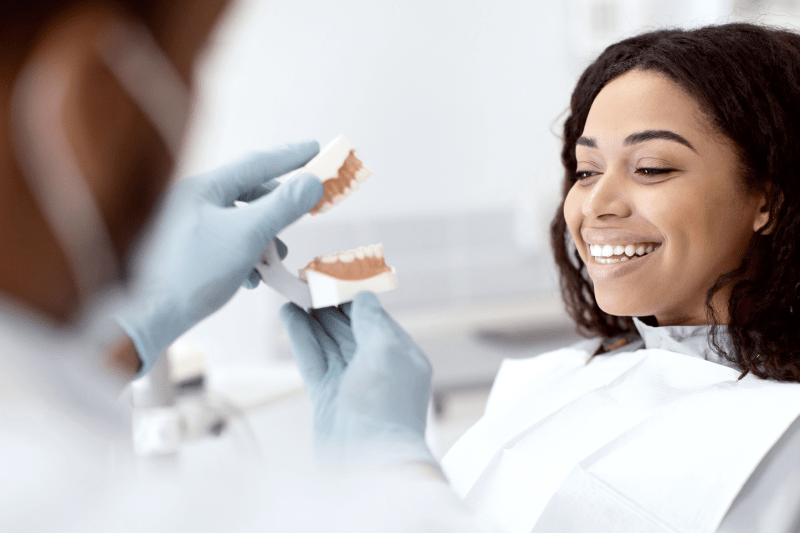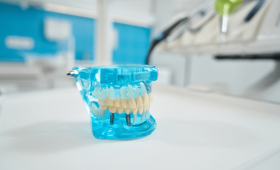What Are the Main Factors Affecting Dental Implant Prices in Scotland?
Dental implant prices in Scotland vary greatly depending on the complexity of the treatment, the brand of the implant, the city where the clinic is located, and the dentist’s experience. One of the most important factors affecting prices is the quality and origin of the implant used; American and German brands can be more expensive. The need for more than one implant or a full-mouth restoration instead of a single implant significantly increases the total cost of the treatment. In addition, prices increase when additional surgical procedures such as bone grafting or sinus lifting are required.
What Is the Average Price of a Single Dental Implant in Scotland?
The cost of a single dental implant in Scotland generally ranges from £2,000 to £4,000 (approximately 2,300 Euro – 4,600 Euro). This price may cover the surgical placement of the implant and the crown to be placed on it. However, some clinics may quote the price separately, offering a price between £1,000 – £2,000 for the placement of the implant alone. Additional fees such as treatment planning, X-rays, and other check-ups are also not included in this price, so the total cost may increase even more. Therefore, it is vital to get a written quote that includes all expenses before starting the treatment.
What Are the Main Reasons for the Price Differences Between Scotland and Turkey?
The dental implant price differences between Scotland and Turkey arise from the economic structures and operating expenses of the two countries. In Turkey, operational costs such as rent, staff salaries, and taxes are quite low compared to the United Kingdom. In addition, the Turkish Lira’s lower value against foreign currencies makes prices much more attractive for foreign patients. Government support for health tourism and competition among clinics help keep prices affordable without compromising on quality.
What Should Be Considered Regarding the Quality of Dentists and Clinics in Scotland?
Dentists and clinics in Scotland offer a high level of quality service due to high educational standards and professional supervision. All dentists are licensed by the General Dental Council (GDC) and must constantly maintain their professional development. When choosing a clinic, the dentist’s experience, patient reviews, and the technological facilities offered by the clinic should be researched. Although it is possible to get dental treatment under the National Health Service (NHS) in the UK, aesthetic treatments such as implants are usually provided through private clinics.
How Does the Quality of Dental Implant Treatment in Turkey Compare to Scotland?
The quality of dental implant treatment in Turkey is at a level that can easily compete with that in Scotland, with experienced dentists and modern clinics. Many Turkish clinics have international accreditations such as JCI (Joint Commission International) and provide services at European standards. Turkish dentists attend international congresses to learn about the latest technologies and treatment methods in the field of implantology. In this way, it is possible to get the same quality of service at more affordable prices in Turkey.
What Are the Main Materials Used in Dental Implant Treatment?
The most common material used in dental implant treatment is titanium, a biocompatible metal. Titanium is easily accepted by the human body and permanently integrates with the jawbone. This feature ensures that the implant is long-lasting. Titanium implants have been used safely in dentistry for many years. In addition to titanium, zirconium implants, which offer an appearance closer to the natural tooth color, are also preferred for patients with aesthetic concerns or metal allergies.
How Long Does the Total Duration of Dental Implant Treatment Take?
Dental implant treatment is generally a two-stage process and can take several months in total. In the first stage, the implant is surgically placed in the jawbone, and a healing period of 3 to 6 months is expected for the implant to fuse with the bone. This process may vary depending on the patient’s general health and bone quality. In the second stage, the treatment is completed by placing the abutment and prosthetic crown on the implant. In emergencies, solutions that are completed in a single session can also be offered.
Is Dental Implant Treatment a Painful Procedure?
Dental implant treatment is a painless procedure as it is performed under local anesthesia. The patient does not feel any pain or discomfort during the procedure. A slight pain or swelling may occur for a few days after the procedure, but this can usually be controlled with simple painkillers and passes quickly. Most patients find the implant operation even less painful than a tooth extraction.
Who Can Get Dental Implant Treatment?
Dental implant treatment can be applied to individuals whose jawbone development is complete (usually over 18 years of age), who are in good general health, and who pay attention to oral hygiene. One of the most important conditions for the success of the implant is to have sufficient bone volume and density. Implant treatment may not be suitable for patients with serious health problems such as uncontrolled diabetes or bone loss. The dentist determines the patient’s suitability for the implant with a detailed examination and X-ray.

How Do Additional Procedures Like Bone Grafting or Sinus Lifting Affect the Cost?
Additional procedures such as bone grafting or sinus lifting may become mandatory for patients who do not have sufficient bone volume for implant placement. These additional surgical procedures increase the complexity and duration of the treatment, which significantly increases the total cost. The cost of bone grafting varies depending on the material used and the size of the procedure. Such additional procedures must be taken into account when planning the total treatment budget.
What Is the Lifespan of Dental Implants?
Dental implants can be used for a lifetime when applied correctly and with proper oral hygiene. Scientific studies show that the ten-year success rates of dental implants are over 95%. Regular brushing, flossing, and going to the dentist for a check-up every six months are of great importance to extend the life of the implant. Staying away from habits such as smoking and alcohol also helps protect implant health.
What Is the Cost of a Full-Mouth Implant Treatment?
Full-mouth implant treatment is usually offered with concepts such as “All-on-4” or “All-on-6”. In these treatments, a fixed prosthesis is placed on a series of implants. The cost of a full-mouth implant treatment in Scotland can range from £15,000 to £30,000, depending on the number of implants, the brand, and the type of prosthesis. This cost may vary depending on the patient’s specific condition and treatment plan.
Why Does Turkey Offer Such Affordable Dental Implants?
There are many reasons for the low prices of dental implants in Turkey. The biggest advantage is the high value of foreign currencies such as the British Pound against the Turkish Lira. This makes the same quality of service much more affordable for foreign patients. In addition, low labor and operational costs, government incentives for health tourism, and competition among clinics help keep prices attractive.
Do the Low Prices in Turkey Mean a Lack of Quality?
The low prices in Turkey do not mean a lack of quality. Turkey has many clinics with high standards in dentistry, experienced and expert dentists. These clinics have international accreditations and use globally renowned implant brands. The important thing is to make a correct and reliable choice by examining patient reviews and checking the clinic’s references.
How Are Emergencies Managed in Dental Implant Treatment?
For rare emergencies that may occur after dental implant treatment (severe pain, bleeding, or swelling), clinics have emergency services or 24-hour phone lines. Before treatment, it is important to ask your clinic what kind of procedure they follow in case of emergencies and which communication channels you should use. In this way, you can get quick support in an unexpected situation.
Do Dentists in Scotland Speak English?
The healthcare system in Scotland operates entirely in English. All dentists and clinic staff speak English fluently. This is an advantage in terms of communication for foreign patients considering treatment in Scotland. Patients do not need translators who provide services in their own language.
Are There Special Packages for Patients from Abroad?
Many dental clinics in Turkey offer special packages for patients coming from abroad. These packages usually include the cost of treatment as well as airport transfers, accommodation arrangements, and in some cases, additional services such as a city tour. These packages make the treatment process more planned and seamless. In Scotland, on the other hand, such packages are not very common and the patient usually has to organize all the processes on their own.
Is a Visa Required for Dental Implant Treatment in Scotland?
Most international visitors need a visa to travel to the United Kingdom. Citizens of the Republic of Turkey are also required to obtain a visa to travel to the United Kingdom. When applying for a visa, you must state that the purpose of your trip is medical treatment. It is of great importance to check the current visa and travel conditions before making travel plans.
What Should Be Considered During and After Dental Implant Treatment?
For the first few days after the implant is placed, it is important to eat soft foods and avoid very hot or cold drinks. Your dentist will usually recommend a soft diet program. You should brush your teeth regularly and clean the area around the implant using dental floss and an interdental brush. Habits such as smoking and alcohol can negatively affect the healing process.
How Often Do Dental Implants Require Maintenance?
Dental implants, like natural teeth, require regular maintenance. You should brush your teeth at least twice a day and clean the area around the implant using dental floss and an interdental brush. In addition, going to your dentist for a regular check-up at least every six months will ensure that your implant lasts a long time. In these check-ups, the condition of the implant and the surrounding tissues is evaluated.
What Are the Reviews of Patients Who Have Had Dental Implant Treatment?
The reviews of patients who have had dental implant treatment in Scotland are generally positive, and patients are satisfied with the professionalism of the dentists and the quality of the clinic. The reviews of patients who have had treatment in Turkey, on the other hand, usually focus on the affordable prices and fast service, as well as the extra services offered by the clinic. In both cases, personal experiences may differ.
What Is the Difference Between a Dental Implant and a Dental Bridge?
A dental implant is an artificial tooth root placed in the jawbone to replace a missing tooth. It provides a natural feel and function because it is integrated into the jawbone. A dental bridge, on the other hand, is a prosthesis placed on the adjacent teeth after they have been reduced to replace a missing tooth. Bridges can damage adjacent teeth and cannot prevent bone loss in the jawbone. Implants are a more long-lasting and protective option.
What Is the All-on-4/All-on-6 Concept in Full-Mouth Treatment?
All-on-4 and All-on-6 are fixed prosthesis concepts applied to patients who are missing all of their teeth or whose teeth need to be extracted. In All-on-4, a fixed prosthesis is placed on four implants, while in All-on-6, six implants are used. These concepts aim to provide a full dental restoration with fewer implants and are widely applied in both Scotland and Turkey.
What Is the Role of Health Tourism Agencies in Turkey?
Health tourism agencies in Turkey facilitate the entire process for patients coming from abroad. They make the patients’ treatment planning seamless by arranging flight tickets, hotel reservations, airport transfers, and clinic appointments. These agencies are usually part of the clinic or have an agreement with them. In Scotland, on the other hand, such services are usually arranged by the patient.

Which Seasons Are Good for Dental Implant Treatment?
There is no seasonal restriction for dental implant treatment. The treatment can be done safely in any season. However, due to the cold and rainy climate of Scotland, it is important to consider the weather conditions when making travel plans. Turkey’s more temperate climate can make the post-treatment healing process more comfortable, so the spring or autumn months are often preferred.
What Should Be Done for Post-Treatment Emergencies in Scotland?
If you experience an emergency after treatment in Scotland, you should first call your clinic’s emergency line. If you cannot reach them, you can call 111 for non-emergency medical help in the United Kingdom. For a serious emergency, you can call 999. Before your trip, it is important to have your insurance and contact information ready for emergencies.
Does Private Dental Insurance Cover Dental Implants?
Most private dental insurance does not cover all or part of the dental implant cost. Insurance companies often view such procedures as aesthetic or keep their coverage limited. However, some support may be provided if the implant is done out of a medical necessity. Therefore, it would be useful to contact your insurance company to learn about the coverage conditions.
What Happens If a Dental Implant Fails?
Dental implant failure is a rare condition and usually occurs due to reasons such as the bone not accepting the implant or an infection. If the implant fails, it is removed by the dentist, and a new implant can be placed after the healing process is complete. Reliable clinics offer a warranty or revision treatment for such situations. It is important to learn the conditions of these guarantees in advance.
What Are the Payment Options in Scotland?
Most dental clinics in Scotland offer various payment options such as credit card and bank transfer. Cash payments are also widely accepted. Some clinics may also offer installment payment options, but this may vary depending on the clinic and the patient’s condition. It would be useful to learn about the payment methods your clinic accepts before starting the treatment.
What Are Patient Rights in Scotland?
Patient rights in Scotland are strictly protected by the UK’s NHS and private healthcare regulations. Patients have the right to be fully informed about the treatment process, get a second opinion, and refuse the treatment plan. Before starting the treatment, it is important to sign a contract or agreement stating all the conditions in writing to protect your rights.
Can You Eat After Dental Implant Treatment?
For the first few days after the implant is placed, it is important to avoid very hot, hard, or spicy foods. The dentist will usually recommend a soft diet. As the healing process progresses, you can gradually return to your normal diet. During this process, which will take a few months for the implant to fully integrate with the bone, it is necessary to avoid putting too much pressure on the implant.
How Right Is It to Decide Based on Price Alone?
Since dental implant treatment is a serious surgical procedure, it is not right to decide based on price alone. Choosing the clinic that offers the lowest price can bring risks such as low-quality materials, inexperienced dentists, or poor hygiene standards. The most logical approach is to evaluate the price along with the clinic’s reputation, the dentist’s expertise, the implant brand used, and the quality of service provided.
What Is the Success Rate of Dental Implant Treatment?
The success rate of dental implant treatment is quite high. When experienced dentists and quality implant brands are used, the success rate can exceed 95%. Factors affecting success include the patient’s general health, oral hygiene, smoking and alcohol habits, and the bone density of the area where the implant is placed.
Is It Safe to Get Dental Implants?
Dental implant treatment is an extremely safe procedure when applied correctly. Implants are made of biocompatible materials that are easily accepted by the body. Working in sterile conditions and with modern equipment is of critical importance to minimize the risk of infection. Following hygiene rules before and after the procedure increases safety.
Are There Specialized Clinics for Dental Implants in Scotland?
Yes, there are many clinics in Scotland that specialize in dental implants, have advanced technology, and work with dentists who specialize in implantology, oral surgery, and aesthetic dentistry. Choosing a specialized clinic is of great importance for the success and reliability of the treatment.
How Far in Advance Should an Appointment Be Made for Treatment?
For dental implant treatment in Scotland, it is usually necessary to make an appointment several weeks or months in advance, especially during peak tourist seasons. For patients from abroad, contacting the clinic in advance for an appointment and travel planning ensures a smooth process. In this way, you have enough time for both treatment planning and travel arrangements.
How Do the Dentist’s Expertise and Experience Affect the Price?
The dentist’s area of expertise and experience are one of the most important factors that directly affect implant costs. A dentist who has received special training in implantology, has many years of experience, and has performed hundreds of successful operations, may charge a higher fee. The quality of service these dentists provide and the low risk of failure can justify this increase in cost.
What Documents Are Required for Dental Implant Treatment?
If you are planning to travel for dental implant treatment, you must first make sure that your passport is current and valid. If a visa is required, it is important to get your visa in advance. Clinics usually ask for your medical history, the medications you use, and your allergies to get information about your general health status. In addition, documents such as dental X-rays and tomography taken before treatment should be sent to the clinic for treatment planning.


